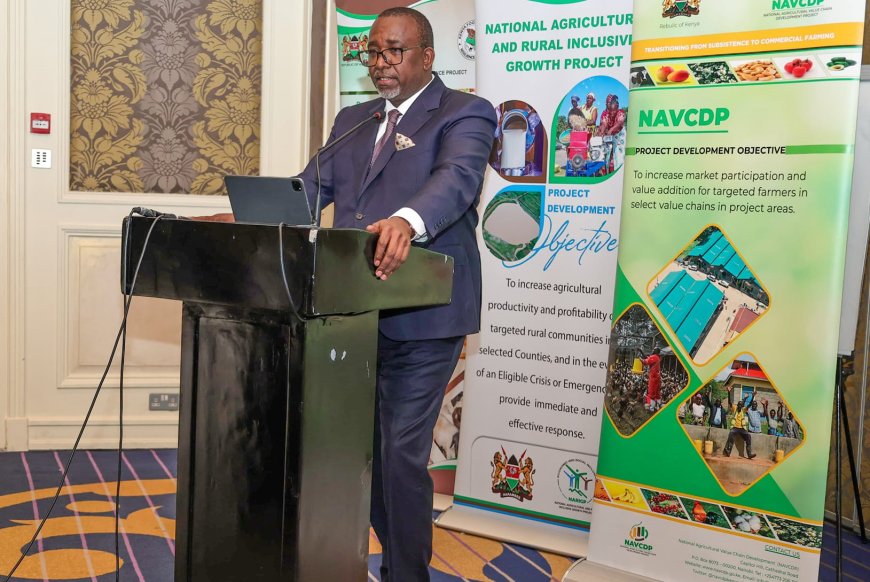Agricultural Insurance Policy poised to reduce losses along the various value chains

Nairobi
Thursday, July 11, 2024
KNA by Joseph Ng’ang’
The government has launched Agricultural Insurance Policy to improve agricultural insurance adoption for risk management and cushion vulnerable farmers against natural disasters.
Agriculture and Livestock Development Cabinet Secretary (CS) Mithika Linturi said farmers in the country have fallen victims to natural disasters like the recent floods and droughts, posing significant social and economic challenges to the sector and the economy.
To address these challenges, Linturi said that the implementation of agricultural insurance through the proposed public-private partnerships will reduce losses along the various agricultural value chains and help smoothen agricultural incomes.
Speaking in Nairobi during the launch of four agricultural sub-sector policies that are intended to address critical constraints to the agriculture sector performance, Linturi said that severe drought strikes the country every 3 to 5 years, causing major losses in crops, livestock and livelihoods of affected communities.
“These devastating shocks push farmers and pastoralists into poverty, thus agricultural insurance offers an opportunity for Kenya to address and manage the risks associated with agriculture,” he said.
The CS disclosed that the challenge the country faces is low penetration of agricultural insurance, which can be attributed to various reasons including lack of capacity to underwrite catastrophic risks associated with drought, floods and other typical agricultural shocks, costly administration overheads and limited access to international reinsurance markets among others.
The CS added that agricultural insurance will also provide the much-needed protection for agricultural producers; especially the vulnerable farmers, thereby keeping them out of extreme poverty and enabling them to improve investments in agriculture.
Linturi said that the subsector policies that they launched are the Kenya Agricultural Extension Policy, (KASEP) 2023; the National Agricultural Insurance Policy, 2023; the Phytosanitary Policy 2023; and, the National Agricultural Mechanization Policy, 2024.
He said Kenya continues to make significant progress in establishing the macro-economic foundations necessary for agricultural transformation and growth with the four policies poised to continue driving this agenda.
Linturi said that as at 2023, approximately 21.2% of the GDP, 33% of employment, and 60% of exports were derived from the agricultural sector underscoring the continued importance of agriculture to the national economy.
“To achieve targeted transformation and growth, the Ministry of Agriculture and Livestock Development developed sector-wide policy framework documents namely the Agricultural Policy and the Agricultural Sector Transformation and Growth Strategy (ASTGS),” said Linturi.
“The Agricultural Policies and the ASTGS are intended to sustainably support Kenya’s economic development with national priorities espoused in the Vision 2030 and the Bottom-up Economic Transformation Agenda (BETA),” he added.
Linturi said that these policies are also intended to help Kenya fulfil its commitments to the Malabo Declaration under the Comprehensive Africa Agriculture Development Programme (CAADP); Africa’s Agenda 2063; and, the United Nations Sustainable Development Goals.
“It is for the above reasons that the Ministry of Agriculture in collaboration with County Governments and other state and non-state actors in the agricultural sector, have over the last three years developed area/industry specific policies to address broader objectives outlined in the mentioned sector policy and strategy,” said Linturi.
The CS added that phytosanitary challenges have become more complex mainly due to increased movement of people and agricultural produce and regulated articles across international borders that facilitate pathways for plant and pest and diseases.
“These challenges erode country capacity for sustaining higher productivity and limit access to markets for Kenya’s produce in the international markets,” said Linturi.
To prevent introduction of plant pests into the country and to facilitate safe trade in plants and plant products, Linturi said that there is a need to have a robust phytosanitary system.
“The National Phytosanitary Policy therefore targets to create an enabling environment for safe trade in plants and plant products and safeguard Kenya’s agriculture from introduction of foreign injurious pests and noxious weeds, which are detrimental to agriculture and food.
The policy aims at providing a framework for enhancing phytosanitary controls, strengthening of the regulatory environment and providing phytosanitary institutional capacity and coordination,” said the CS.
Courtesy; KNA
What's Your Reaction?
































































































































































































































































































